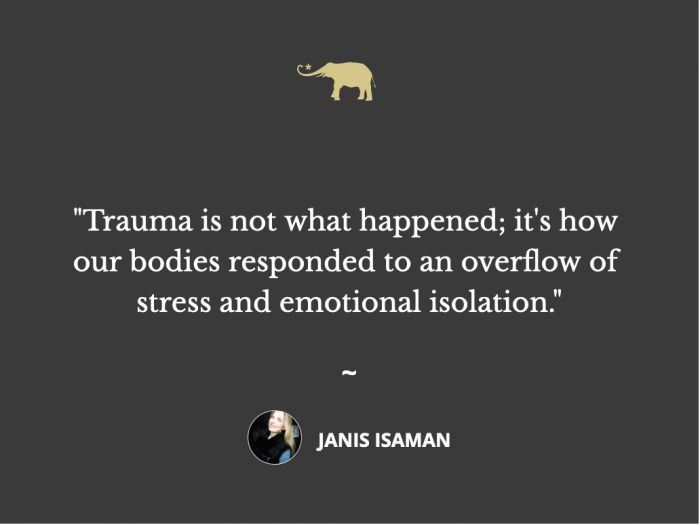My back felt like it would break.
A searing heat encased my spine vertically, sending waves of pain up to my neck and out through the wings of my shoulder blades.
I was in such emotional pain that my rib popped out of place.
The cycle of anxiety had already begun.
The rumination and preoccupation were ruinous to my productivity. Without my consent, my body’s resources and mental energy directed themselves toward solving the unsolvable.
The pervasive and intrusive nature of this circular analysis meant that it was difficult to concentrate on anything else or even to sleep at night.
My body hurt, and so did my brain.
It was so normal for me that I didn’t even realize it wasn’t how other people felt when suffering from emotional distress.
And it all rooted back to my “happy” childhood.
Many of us believe we had a perfect childhood, as we can easily recount trips to Disneyland or fun backyard summers that included dripping popsicles, Slip N Slides, BBQs, and stargazing.
These memories are true and valid, but what we often don’t account for is the unmet needs of our youth: the feelings that were not understood, the stress that was suppressed or never processed, the attention we never received. All barely perceptible to the naked eye of our parents or the neighbors, yet deeply impactful to our brain development.
Because such memories are rarely the focus when asked to recollect our youngest years, most of us cling to the notion that we had gilded childhoods.
Yet, in adulthood, if we get anxious or pull away from partners and people who attempt to deepen connections or struggle to connect to the truth of who we are physically or emotionally are within ourselves, we need to look deeper.
Did we truly have the happy childhood we think we had?
As a child, I not only had all my material wants taken care of, but I also had parents who loved me.
One of my mom’s pet phrases was “as a family,” which was a code word for “we do things together, no man left behind.” My parents, my siblings, and I were immersed in togetherness.
From attending the school plays and supporting the science fairs to vacations and mealtimes, there was no doubt in my mind that we were given opportunities and care of the utmost kind.
We were loved.
Yet, below the naked eye, something was missing. And it took me until well into my adulthood and my Compassionate Inquiry training to put my finger on it.
Childhood trauma is unmetabolized pain that speaks to a lack of support that we once needed but never got.
Our sensitivities to the world and our emotional experiences are different, but our adversity can be evaluated with a few simple questions:
>> Did we ever feel unhappy or sad as a child?
Most of us can agree that we did, and some of us had increased needs for an adult to help us navigate the rocky emotional terrain we encountered. The more emotionally sensitive we were, the more we needed the attunement and connection of a parent to guide us.
>> Who did we speak to about that emotional pain?
By the time most of us have memories that we can recall, we usually report the same answer: nobody.
>> Who would we have wanted to speak to?
It would be a rare person who disagreed: the person we were closest to, usually a parent or caregiver.
As an adult, if we think of parenting a child who is unhappy or sad and our son or daughter doesn’t talk to us about it, how would we explain it?
Most of us would, at first, feel like a failure. Then we would conceptualize the many versions of “why”:
We were busy.
We were not tuned in or paying attention.
We were stressed.
We were multitasking.
We didn’t have the skills to manage our own emotions, let alone our child’s.
The child didn’t want to burden us, or our child doesn’t feel safe or comfortable.
How happy is it when we, as a child, could not go to our own parents with pain, sadness, sorrow, worry, or fear? Not very happy at all.
The myth of our own happy childhood is not wrong; it may simply be incomplete.
I remember crying in the car as we pulled out of the driveway; a visit to the relatives concluded with me in tears. As we pulled away, my parents sternly told me to “stop being silly.”
My sister had been gifted a book. I had received: nothing.
To my young self, this triggered jealousy, sadness, a sense of being invisible, fear that I was not enough and didn’t matter.
To my parents, who wanted to drive the car without distraction, it meant that I should collect myself and accept what happened without further conversation.
I said nothing more and talked to no one, but I can recall the pit in my stomach even as an adult. I had no way to process the incident and was left on my own to create explanations and meaning.
My parents weren’t paying attention to this small matter; they were trying to get us to the next destination.
No matter what happened or how much they loved me, the effects of repetition—for different reasons and in different ways—added up. The love felt by my parents did not automatically translate into love experienced by me, and none of the vacations or material goods could ever make up for that unseen and unmetabolized pain.
My brain developed with the constant emotional stress that was never resolved, never supported, and never healed.
I had a happy childhood. And I also emerged from my youth with childhood trauma.
It does not take major adverse experiences for the circuits of the brain to change. No matter the adults’ intent, desires, or dreams, a lack of attunement—a collection of emotionally hurtful incidents and a gap created by stressed out or busy parents—early in life means the architecture of the brain connections and chemicals are altered.
Our brain’s circuitry develops differently than it would if we have an empathetic, abiding witness to be present for us and help us process our experiences.
Trauma is not what happened; it’s how our bodies responded to an overflow of stress and emotional isolation.
We can begin to heal our unhealed developmental traumas, otherwise known as childhood wounds, first by recognizing the myth of “the happy childhood” and then by having compassion for both our caregivers and ourselves.
By acknowledging that what we once deemed a childhood nirvana was an incomplete version, we can begin to better understand why we have adult coping mechanisms and triggers. These patterns, such as anxious ruminating or avoidance, once helped us survive.
We can begin to feel acknowledged and witnessed in our experience—start to heal the wounds left behind by childhood—and rewire our brains.
We can begin to gift ourselves the book we never got in childhood.







Read 56 comments and reply